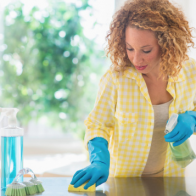 Food is my first love. From the early days of Mom-made meals to my first cooking experiments as a young woman, food has served as a source of comfort and joy. To me, What To Eat is the most important decision of the day, yet these days, I’m learning to make that decision with an extra helping of love.
Food is my first love. From the early days of Mom-made meals to my first cooking experiments as a young woman, food has served as a source of comfort and joy. To me, What To Eat is the most important decision of the day, yet these days, I’m learning to make that decision with an extra helping of love.
Growing up, I overindulged on special occasions. We toasted accomplishments over plates of pasta, and sang “Happy Birthday” with feasts fit for queens. I learned at an early age that cleanliness was next to godliness when it came to cleaning your plate, and that throwing away leftovers was a damn-near culinary sin.
As a result, I’ve come to associate happiness and good times with hearty meals consumed until you’re practically comatose. I seek pleasure on my plate, and it is my duty to scrape that plate clean. The ritual of eating dominates my attention for those fleeting moments—from preparation to first bite—and gives me something to focus on.
Over the years, this misguided devotion has invited a new emotion to the dinner table: Pain. Overindulging is no longer reserved for special occasions, and I don’t eat with the simple purpose of nourishing my body. I eat out of boredom, stress, and oddly—to feel full. I don’t put the fork down until my hunger pangs have long since disappeared. I eat until I’m loosening my belt, unbuttoning my jeans, and patting my new hard-earned Buddha belly. Yes, the feeling of being overstuffed is uncomfortable, and even painful sometimes, but I’ve somehow learned to associate that discomfort and pain with satisfaction and happiness. It’s the idea that it ain’t good-eatin’ unless I’m left hobbling to the bed to stretch out for a breather.
It only recently occurred to me that my complicated relationship with food—and ultimately with life—has not been a loving one.
The same pain-is-pleasure belief that I have with food has unconsciously blended into my personal relationships. The more uncomfortable and painful a partnership has been, the longer I stick around. From my first boyfriend at 16 years old to the serious and casual encounters I had later, there’s a noticeable a pattern. If a guy showed me even the slightest attention—a date here, a compliment there—that was enough for me to voluntarily slip on the rose-colored glasses and turn a blind eye to his dishonesty, hurtful words, and broken promises. Again, it’s the idea that it ain’t good-lovin’ unless I’m left brokenhearted and hobbling to the bed to stretch out for a breather—and a good cry.
In my reckless search for love, I found the attention I craved in the scraps of affection tossed my way from boyfriends, and in the painful aftermath of eating too much. In the last year alone, I’ve simultaneously gained 20 pounds onto my small frame, and lost 20 pounds worth of confidence. After a particularly rough patch with a recent long-term relationship, I had a breakthrough. In order to heal and end this cruel pattern, I had to change my life—starting with my first love. I’m giving myself the special attention that I deserve by first approaching mealtime with a more conscious and loving attitude. I have vowed:
To put less on my plate and to stop eating when I’m full. I’m learning to follow Rule #46 of Michael Pollan’s, “Food Rules”: Stop eating before you’re full and try to eat only to 67 to 80 percent capacity. According to Pollan, the French use the phrase, “Je n’ai plus faim,” meaning, “I have no more hunger.” I’m now able to recognize when I literally have no more hunger, and I then muster up the willpower to step away.
To take my time. I sign out of Facebook and Gmail. I put the books and magazines down, close my eyes, and enjoy the sensations of tasting and chewing a yummy meal or snack. You’d be surprised at how much slower you eat, and how much more satisfied you feel.
To stop and ask myself, “Is this loving?” Is reaching for cookie #4 loving? Is finishing a half tray of brownies the way I really want to treat myself? Is filling up on last night’s ravioli right before bed going to make me feel good? The answer is usually, “No.”
To drink more water. My fridge adventures and cabinet raids are desperate attempts to fill my attention with food that I really don’t want. Instead, I reach for a glass of water, and fill my body with what it needs.
To check in with myself throughout the day. When a craving or an impulse sets in, I try to figure out the real issue. Am I bored? Excited? Anxious? What can I do to give myself some loving attention in this moment? I find that this diversion opens the floodgates to creativity. I spend more time blogging, researching story ideas, reading, catching up on emails and phone calls, and working on supporting my passions instead of feeding my habits.
To pat myself on the back. I wake up every morning, look in the mirror, and compliment myself. “Damn, you look good today,” and “You’re doing an amazing job,” are in heavy rotation.
To eliminate guilt. It’s a terrible feeling to beat yourself up for not accomplishing a goal that you’ve set for yourself. If I don’t stick to my vows for the day, I don’t strip myself of value simply because my eyes were bigger than my stomach. It’s ok. Tomorrow is another day.
To take it one day at a time. Nobody’s perfect and we’re all works in progress. True love takes time.







You’ve articulated in this article how I’ve often felt. I was also raised to be a member of the clean plate club and I still find it difficult to not eat everything and “waste not, want not”. I liked your correlation of food with relationships as I also believe there can be destructive patterns. Keep up your passion to take care of yourself!
Thanks for reading, Wendy! Healing can be a tough process, but it’s a freeing experience once you’re able to recognize and accept the sources of your pain. When you know better, you do better.